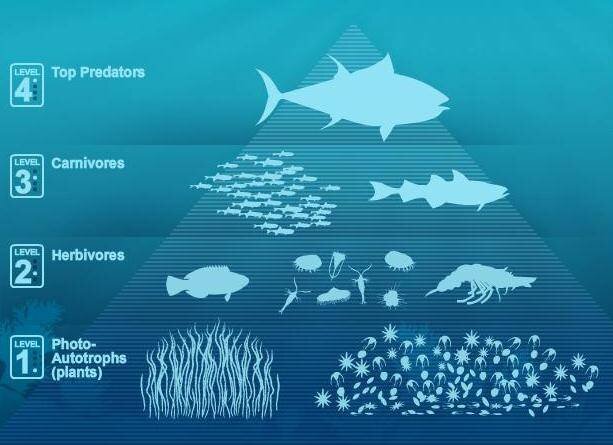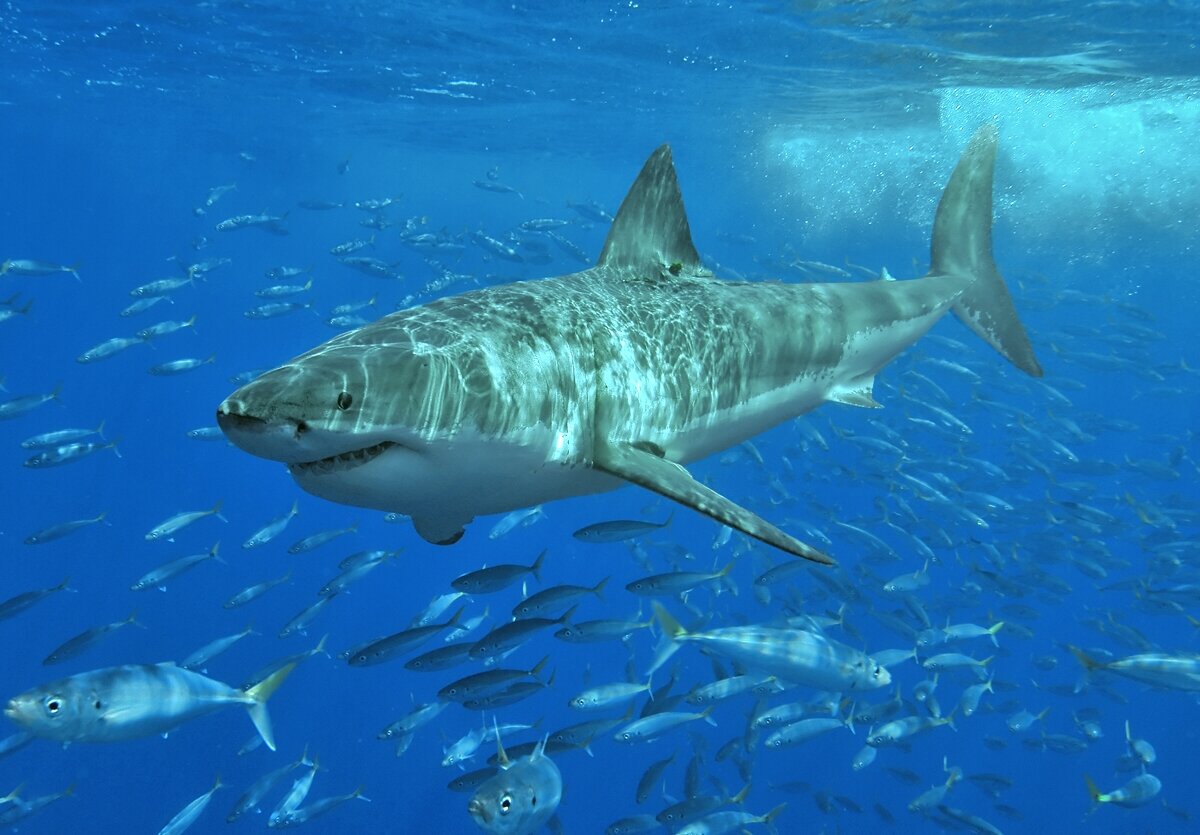This July, we’ll be swimming in shark content, from NatGeo’s SharkFest and Discovery Channel’s Shark Week to the Science Mill’s own Shark Week, July 28-August 1. You can even swim along a reef—virtually—for a limited time with the return of our SciDive 4D experience!
To kick things off, let’s look beyond their fierce reputation and focus on a few of the many benefits sharks provide. Sadly, human activities kill as many as 100 million sharks each year—compare that to the few dozen shark attacks reported globally, and it’s clear who is the real threat. But you can make choices that support sharks and protect ocean health.
Three ways sharks help the planet
1. Sharks keep the food web in balance.
Many large shark species are apex predators at the top of the ocean’s food web. They’re pretty flexible about what they eat, chowing down on whatever prey is plentiful and switching to other foods if a prey population is low. In this way, apex predator sharks keep the food web in balance. Areas with healthy shark populations tend to have lots of other species, too—aka more biodiversity.
Without sharks to thin their numbers, other species may overeat, increase competition and set off a cascade of destructive changes. In the oceans near Australia, fewer sharks meant the grouper population grew; the extra groupers gobbled up algae-eating fish species and, without those helpful fish to keep the algae in check, stressed-out coral reefs struggled to survive. (Scientists also call sharks “keystone species,” because the “building blocks” of an ecosystem start to tumble without them.)
Sharks don’t even need to eat to help balance the food web. Researchers have found that tiger sharks’ intimidating presence alone affects where animals like green turtles and dugongs graze, which in turn protects seagrass ecosystems.
(Also, a shout-out to deep-sea sharks! As seafloor scavengers, they keep the ocean’s carbon cycle going.)
2. Sharks get nutrients moving.
Sharks can cover a lot of ocean, with some species migrating hundreds or even thousands of miles. Their “pit stops” along the way support ocean health: by eating in one location and pooping miles away in another, sharks help to cycle nutrients between ecosystems. When sharks dive, it also helps to mix nutrients across different ocean depths.
Grey reef sharks follow a daily routine of swimming out to hunt at night and returning by day to rest among lagoon reefs—where their poop provides fresh nutrients essential to the coral reefs’ health.
3. Sharks stop diseases from spreading.
Sharks often prey on weak and sick animals, which may sound like an unfair face-off. But by feeding this way, sharks actually keep prey populations healthier. Sharks help cut down infectious diseases and slow their spread.
Three ways you can help sharks
1. Avoid shark products and support laws that protect sharks.
Shark fins, considered a luxury ingredient, can sell for major money, which has unfortunately fueled destructive overfishing of sharks. Fins from as many as 73 million sharks are sold each year. Demand for shark meat adds to the problem, as does shark oil, which shows up in make-up and vitamin supplements—so be sure to check labels. And that shark tooth necklace on vacation? Best to skip it, too.
The Shark Fin Sales Elimination Act of 2021 (H.R. 2811/S. 1106) is currently in the U.S. Congress. You can learn more and share your support for the bill through the non-profit Oceana.
2. Make smart choices about seafood.
Scientists estimate that commercial fishing has shrunk populations of sharks and other large predatory fish by 90% worldwide. Many sharks are accidentally caught during longline and trawl net fishing, and rarely survive. To find more sustainably sourced and shark-friendly seafood options, Seafood Watch is a great resource—enter the seafood species you’re interested in and it will provide best choices, good alternatives and things to avoid.
3. Speak up for sharks!
Keep learning about sharks and spread the word about all the awesome things they do for our planet. You might just change someone’s attitude: seeing sharks as ocean protectors instead of people-eating predators is the first step toward helping sharks.




Adopt a shark virtually
There are several scientific tracking sites and apps that let you follow sharks in real time. Pick a shark (sites give them nicknames or ID numbers) and check back often to see where it travels throughout the year.
— Does your shark mostly travel solo or are there other sharks nearby?
— Does your shark spend more time in the open ocean or close to the shore?
— How many sharks do you notice close to the shore at different times of the year?
— How do you think your shark navigates?
— How do you think your shark finds its prey?
Keep track of what you observe and wonder—you may want to read up on your shark species to find out more!
Shark tracker sites & apps:
OCEARCH Global shark tracker
Atlantic White Shark Conservancy Sharktivity Map
Pacific Islands Ocean Observing System Hawai’I Tiger Shark Tracking
Conservation International Whale Shark Tracker